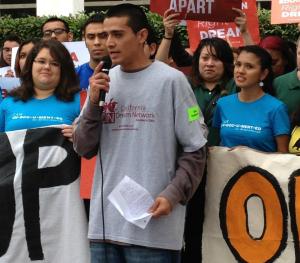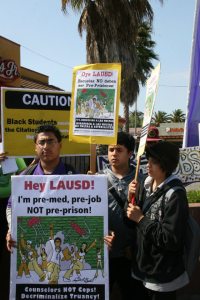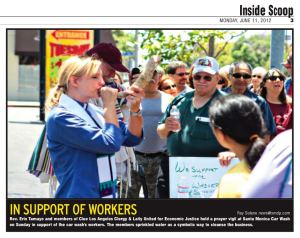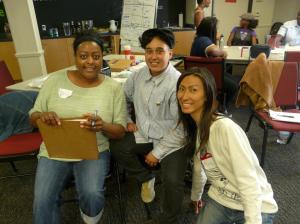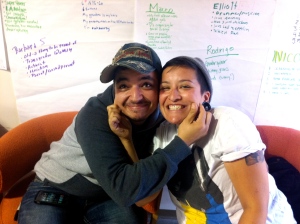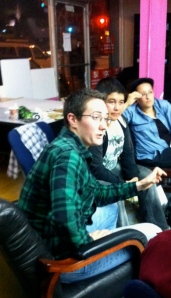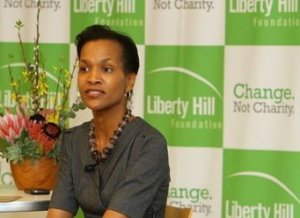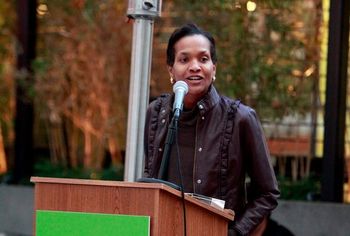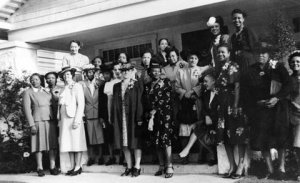 Interns (top l to r) Allison Goldberg Brinton Williams, Nichole Klein; (bottom l to r) Liora Ziv, Joanna Kabat.Not pictured: Olivia Stutman.
Interns (top l to r) Allison Goldberg Brinton Williams, Nichole Klein; (bottom l to r) Liora Ziv, Joanna Kabat.Not pictured: Olivia Stutman.
By volunteer contributing writer Mark Bizzell
Liberty Hill’s internship program allows us to tap into the talent, energy, and insight of students from around the country. Three years ago, Board member and volunteer Paula Litt took on the task to expand the program. For summer internships, she starts getting emails in January from interested students.
This summer, we have had a full complement of six students working with us for three to five days per week for eight or more weeks between June and September. It’s been an exciting season, with students from a range of institutions, including Ivy League schools and a charter high school, working on often-challenging projects as they joined our efforts to advance environmental and economic justice, to expand LGBTQ rights, and to combat poverty.
Joanna Kabat describes herself as being a bookish kid and volunteering for local organizations at an early age. “Both of my parents were involved with local shelters, schools, religious institutions and health advocacy groups; that really rubbed off on me,” she says. Joanna grew up in the San Fernando Valley, attended Barnard College, and worked for American Jewish World Service and Hebrew Immigrant Aid Society in New York. She returned to L.A. to pursue a master of public affairs degree from the USC Sol Price School of Public Policy. Her research is on the capacity demands that immigration reform could make on L.A.’s community-based organizations.
Among the highlights of her summer at Liberty Hill were accompanying Community Funding Board (CFB) members on site visits to Black Women for Wellness, Coalition for Economic Survival, and InnerCity Struggle. Under the mentorship of Margarita Ramirez, Joanna took notes as the community funding board met and she helped develop landscape analysis summaries for the Education, Housing and Land Use, and Workers Rights focus areas of the Fund for Change. Joanna also worked with Liberty Hill’s communications team on a usability analysis of the website, on the monthly round-up of grantee news articles (“From Frontlines to Headlines“) and on social media marketing.
Liora Ziv has a unique perspective on the world. Her father was raised in a Yemenite slum in Israel while her mother grew up comfortably in Los Angeles. The family moved to Malibu when Liora was just a baby. Growing up, her parents taught her a passion for human and civil rights and to look at the world with a tolerant but critical perspective. She attended Georgetown University, majoring in social justice analysis and spent a semester in Santiago, Chile with a nonprofit called Proyecto Propio that developed grassroots organizing in low-income communities. She is currently pursuing a master’s degree in public policy at UCLA where she also works as a research assistant on immigrant reform projects. Through her previous employment with Social and Environmental Entrepreneurs, she discovered Liberty Hill’s intern program.
“Liberty Hill has opened my eyes to the world of philanthropy and I want to explore working at a foundation when I graduate,” she says. Working alongside program department staff members, Liora contributed to the Wally Marks Leadership Institute’s new Commissions Track program by doggedly hunting down minutes from meetings of the more than 50 boards and commissions in L.A. Her research will be used for training materials to prepare individuals from different communities to apply to serve as commissioners. She says that in school the focus of political studies is often on state and federal policies, but her time at Liberty Hills has taught her how local politics have an impact.
Allison Goldberg, from Columbia, Maryland, is proud of her hometown, because Columbia is considered a model of mixed-income housing for the country. A recent graduate of Loyola Marymount University, she majored in political science with a focus on socioeconomic inequalities in the U.S. She worked this summer on compiling marketing research for the Wally Marks Leadership Institute, and she also worked on social media and multi-media projects.
“I hope to pursue a public policy career in education and criminal justice reform, and earn a master’s in public policy,” she says. “In college, I took courses on criminal justice policy, and completed my thesis on the school-to-prison pipeline.” That is why she is passionate about Liberty Hill’s “Brothers, Son, Selves” initiative, which has made strides in reforming school discipline policy. Allison, who has been a volunteer at a Boyle Heights nonprofit for the past four years, is also inspired to see how the Liberty Hill-supported “Clean Up Green Up” environmental policy initiative has the potential to improve air quality in some of L.A.’s most polluted neighborhoods.
Nicole Klein grew up in Los Angeles and is entering her senior year at Barnard College, where she is a political science major. At Liberty Hill this summer, Nichole worked with Barbara Osborn to explore how to best increase Liberty Hill’s and its grantee’s visibility using the social media site Pinterest. With staff member Blanch Ross, she did research for donor-advised funds, and on event venues for our outreach and campaign work. Nichole aspires to a career in health advocacy. “The inequality of our health care system is pervasive,” she says, “Public health and the right to health care is an important part of the social justice dynamic.” Her time at Liberty Hill, she says, gave her insights into how local governments, nonprofit organizations, and community leaders work together for real change.
Brinton Williams is interested in politics, and he volunteered with President Obama’s second presidential campaign during the summers of 2011 and 2012 while a student at Flintridge Preparatory School in La Cañada Flintridge, California. He grew up in Pasadena, and starts his second year at Yale University this fall. Friends and family recommended Liberty Hill’s internship program after Brinton expressed interest in progressive issues. Over the summer, Brinton worked with staff member Cassie Gardner on a project with East Yard Communities for Environmental Justice, conducting outreach to create a database of business owners and citizens in Commerce which will be used to do a survey on the environmental situation in the community.
“This summer has been an excellent opportunity to see the fruition of years of effort by Liberty Hill in the fight for environmental justice, with the City Council voting to develop the “Clean Up Green Up” policy,” Brinton says. The post for Liberty Hill’s blog that he contributed about that important step in the campaign was a surprise assignment, but when asked, he gamely wrote up an informative on-the-scene article. Brinton wants to pursue a career in public policy, perhaps becoming a community organizer or working for an organization like Liberty Hill.
Olivia Stutman enters her sophomore year this fall at Palisades Charter High
School in Los Angeles. She is a member of YMCA’s Youth and Government Organization, which emulates governmental processes for students. There she debated a prison reform bill which was before Congress in a mock-government setting. It’s one of the activities that she has pursued because of her interest in social justice. Olivia worked this summer with staff members Adrine Akopyan and Carol Lee, updating the Liberty Hill database and inputting events and contacts.
“Interning at Liberty Hill enabled me to see how a foundation operates and my work this summer exposed me to the many donors that make equality a reality,” she notes. Olivia aspires to attend an Ivy League school, majoring in political science and business. She is currently in the process of developing an organization that assists families with a loved one in the hospital by providing them with essential services.
Liberty Hill’s 2013 summer internship experience was anchored by six “brown bag” education sessions during which staff members made “101” style presentations on Liberty Hill’s history, social justice communications and fundraising, grassroots organizing, grassroots leadership development and training and the Clean Up Green Up campaign. The special educational opportunities are a highlight of the summer, but Liberty Hill’s internship
program runs year-round.
“We advertise online, but get a lot of interest word-of-mouth based on Liberty Hill’s reputation,” says Paula Litt. “In addition to undergraduate and graduate students, there are opportunities for high school students.” Some obtain school credit for their internships, and the program is structured so that participants get hands-on experience in meaningful projects.
For postings of current internship opportunities, please go to https://www.libertyhill.org/aboutus/jobopportunities, and to apply for these or inquire about future opportunities, please send a cover letter and resume to Paula Litt at PLitt@LibertyHill.org.










